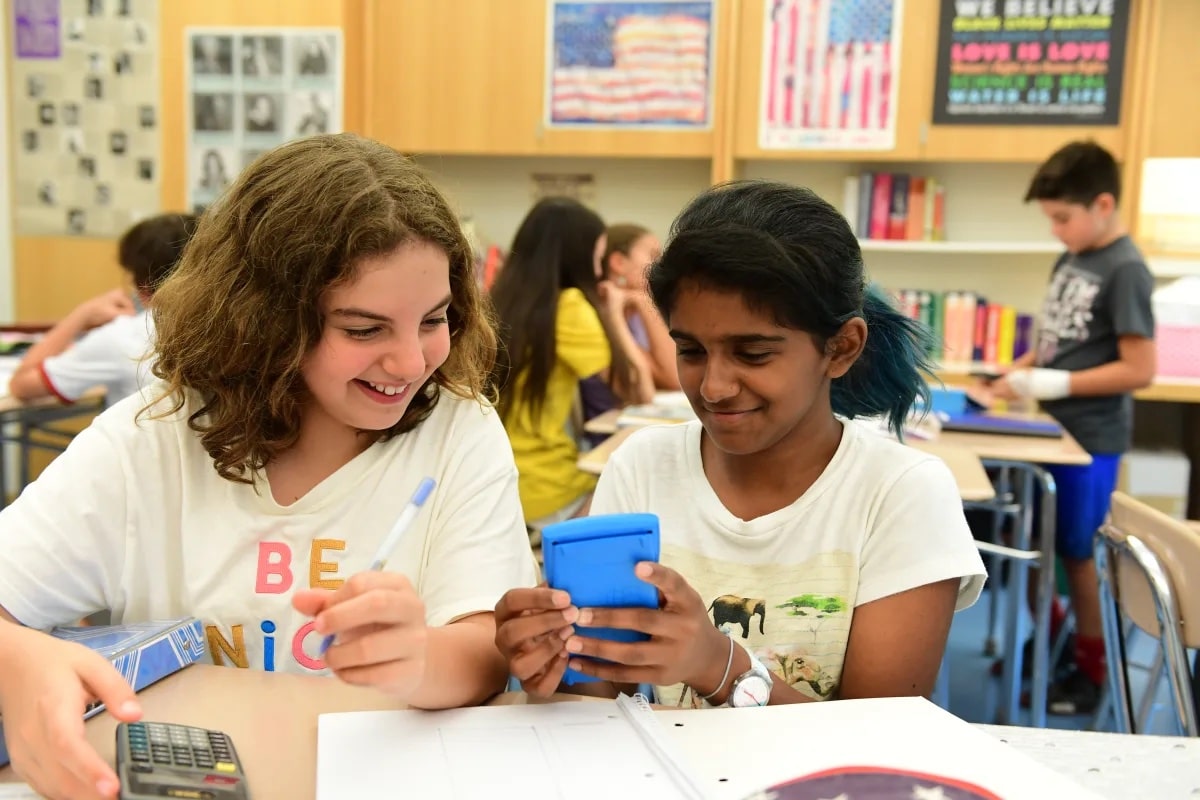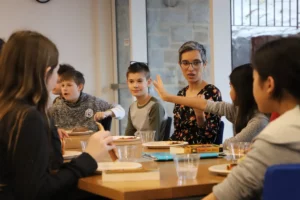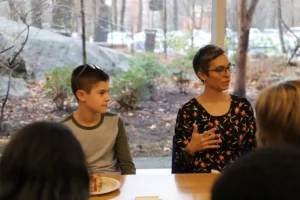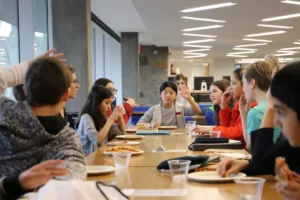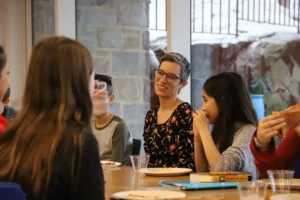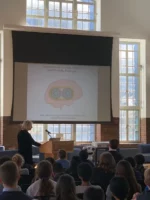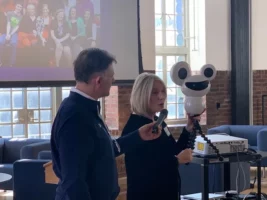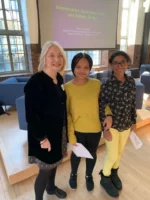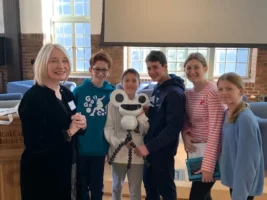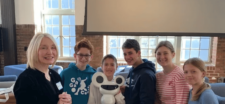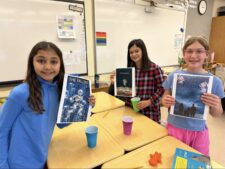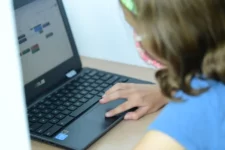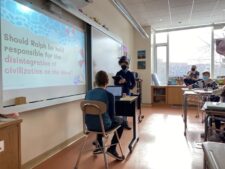Fieldston Middle serves students in 6th through 8th Grades. These years are filled with transition, and our focus is on supporting students’ social and emotional learning. Our instructional methods are rooted in our commitment to academic excellence, progressive education, and ethical learning.
Experience Fieldston Middle yourself in this video!
English
The English program develops passionate readers, writers, and scholars who use the power inherent in communication to transform the world. Through reading literature, students learn to understand themselves, their communities, and the diverse world around them. They become writers who can produce clear and coherent writing appropriate to task, purpose, and audience.
We are committed to developing students who read closely in order to offer insightful interpretations of texts that go beyond the literal level; assess how point of view, purpose, and audience shape the content and style of a text; support claims with specific evidence; maintain rich and rewarding independent reading lives; organize, develop, and refine writing to communicate clearly; analyze the patterns and structure of language; and use writing as a means of striving for social justice.
We expose students to a wide range of contemporary and classic literature, chosen for its balance of genres and authorial voices while guiding students in making reading choices through access to robust classroom libraries, as well as the Tate Library. Literary texts serve as models for students’ own writing, and we use writing to discover and deepen thinking. Our teacher embed grammar and vocabulary instruction in the context of writing and reading, and we use technology to facilitate revision and collaboration.
Ethics
In ethics, we work to build skills of critical inquiry and self-examination at each stage of development so that a student’s social, emotional, and academic development are addressed hand in hand with moral development.
As students navigate the transition from childhood to adolescence, they have opportunities to explore their social identities and examine issues of integrity in decision-making. Our process and content are student-based, and students learn from both teachers and trained Fieldston Upper student-leaders.
Our goal at every stage is to challenge students to look at issues through multiple ethical lenses, excavate and develop their own belief systems, cultivate critical literacy, and grapple with questions they find relevant and engaging.
History
The History Department aims to instill an understanding that the present is influenced by the past. While developing critical reading, writing, and researching skills, students learn to access and analyze information about historical and current events. Students make connections across historical themes while identifying and discussing issues of social justice — past and present — and becoming equipped with tools for activism. Over the three-year study of American History, World Geography, and Ancient History, students understand that history is not just facts and dates, but instead the story of who came before and how they have shaped our world. This understanding helps students shape their own beliefs and develop an appreciation for people, ideas, and experiences that are different from their own.
Through history instruction, we develop students who understand the basic tools and language of history, know the importance of using evidence to support historical claims, take organized and useful notes and refer to them for class discussions and assignments, identify and find their own primary and secondary sources for research, navigate the Tate Library and its resources, develop a strong thesis statement based on a question about a historical topic, understand the process of research and essay-writing, and demonstrate mastery of the content presented.
We use direct instruction, collaborative group work, project-based activities, class discussions, and examination of historical documents, including both primary and secondary sources.
Languages
The goal of the Department of Modern and Classical Languages is to empower students to thrive in authentic situations, develop curiosity and confidence as lifelong learners of languages, and embrace ethical values as citizens of the world. Our program offers classes in Mandarin Chinese, French, Spanish, and Latin. All four languages are offered at the beginner level in 6th Grade. We anchor our work in our School’s values of academic excellence, progressive education, and ethical learning as our students gain rich linguistic, cultural, and historical perspectives and knowledge.
Our students develop the skills necessary to communicate in their language of study on an array of topics, make connections between their language of study and their native language, and apply cultural competency to engage with diverse communities and individuals.
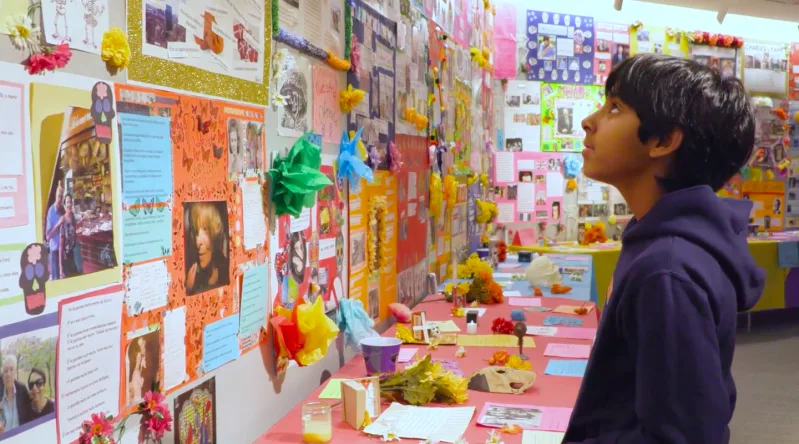
We teach in the target language, facilitating student-centered activities in all four modes (listening, reading, speaking, and writing). Our Language teachers use a balance of emphasis on grammatical accuracy and effective communication. Classes maintain a focus on interdisciplinary work; real-world applications; and the use of authentic material such as songs, films, photographs, visual art, fiction and nonfiction texts, online news, and overseas websites. Students benefit from technology such as blogs, smartboards, online writing and recording tools, and presentation and creative software, and students have the opportunity for trips within New York City and abroad.
Math
The Math Department educates our students in mathematical skills, concepts, analytical thinking, and problem-solving. We do this in a progressive framework: Instruction centers on student engagement, the program matches the needs of each student, and we prepare our students for further studies in higher-level mathematics. We want our students to have the ability to bring mathematical insight to problem-solving in a manner that helps them change their environment in an ethically responsible way.
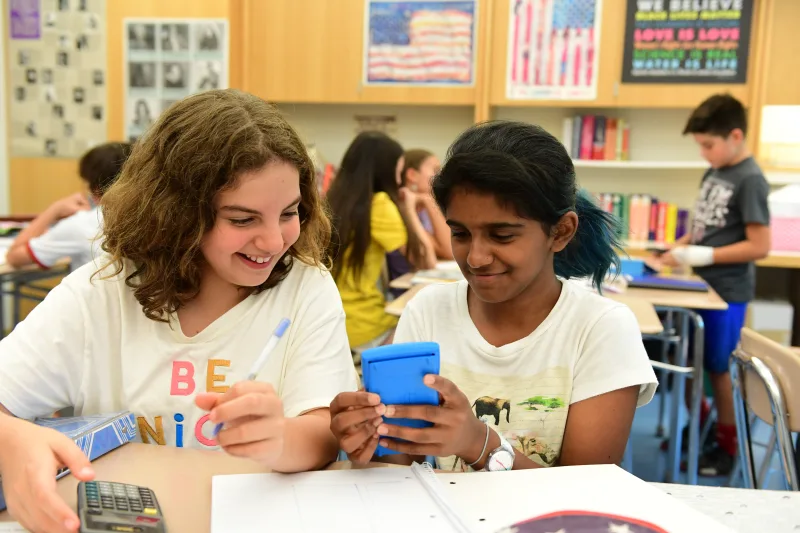
We are committed to guiding students to develop fluency in basic computational skills; demonstrate a dual understanding of mathematical concepts and procedural algorithms; grow logical and critical-thinking skills to solve problems, including those where no obvious path is apparent; communicate clearly and accurately about quantities, relationships, and unknown values through the use of signs, symbols, models, graphs, and mathematical terms; recognize patterns and make connections among mathematical ideas; transition from concrete to abstract thinking in an age-appropriate manner; and apply mathematical knowledge to real-world situations beyond the classroom.
Instruction includes small- and large-group work; student-centered and student-driven projects which, when appropriate, connect with student interests and social and ethical issues; individual homework and classroom assignments; student-centered classroom discussion; integration of technology as a teaching and learning tool; and puzzles, games, and contests. Our students are placed into leveled classes so they may approach topics at the pace and depth at which they are most likely to master concepts successfully, and our teachers use differentiated instruction and individualized pacing whenever possible. (This includes one-on-one extra help sessions, many varieties of assessing student performance, extra credit work, and challenge extensions.) Our students also have the opportunity to reflect on and learn from mistakes and misunderstandings, so that they may gain confidence moving forward.
Music
The Music Department is designed to provide a well-rounded and high-quality music education through a hands-on experience. Each student learns to collaborate in large ensembles and perform music on either an instrument or voice. Our goal is that each student experiences music firsthand and develops the skills required to perform and understand a diverse array of musical styles. Music at Fieldston Middle is about not only acquiring a certain skill set but also working together in a diverse group toward common long-term goals and developing respect for peers regardless of ability level.
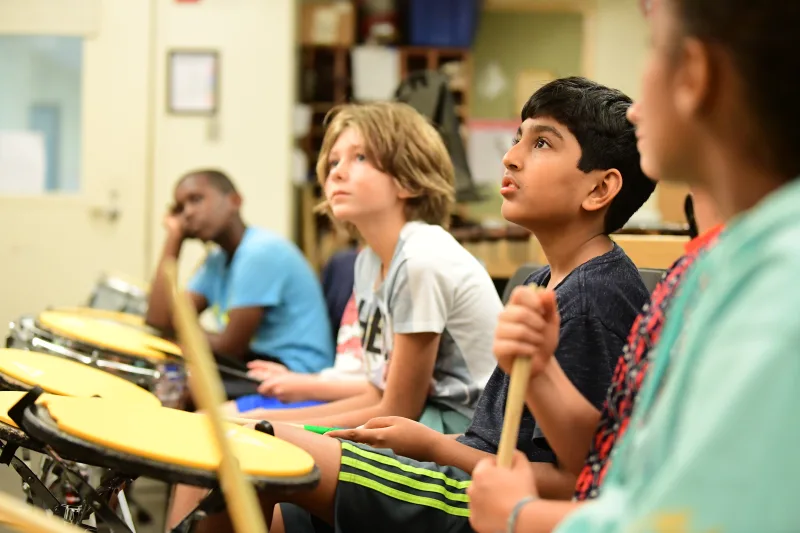
We are committed to developing students who understand the basic tools needed to perform music; know how to work together toward a common goal; understand and learn to appreciate the arts during their time at ECFS, as well as after graduation; work well in large and small groups; appreciate that music and the arts are essential to a complete education; and tap into their natural creativity and ingenuity in whatever field they study.
Instruction includes regular practice sessions for each ensemble, sectional work in small groups, and student input in choosing material and arranging it for performances. Our curriculum is built on thorough instruction in music theory; class discussions of music, including historical and social context; and a multicultural range of musical selections from a diverse array of cultures. There is an expectation of self-discipline and mastery, achieved through rehearsals and regular practice at home, and our teachers assign regular written homework.
Physical Education and Athletics
The mission of the Physical Education Department is to provide learning experiences for our students that will promote the values of empathy, kindness, and physical activity throughout their lifetimes. We encourage students to achieve a balanced and healthy life through a comprehensive curriculum focusing on both traditional and non-traditional sports and centered on social and emotional health and well-being.
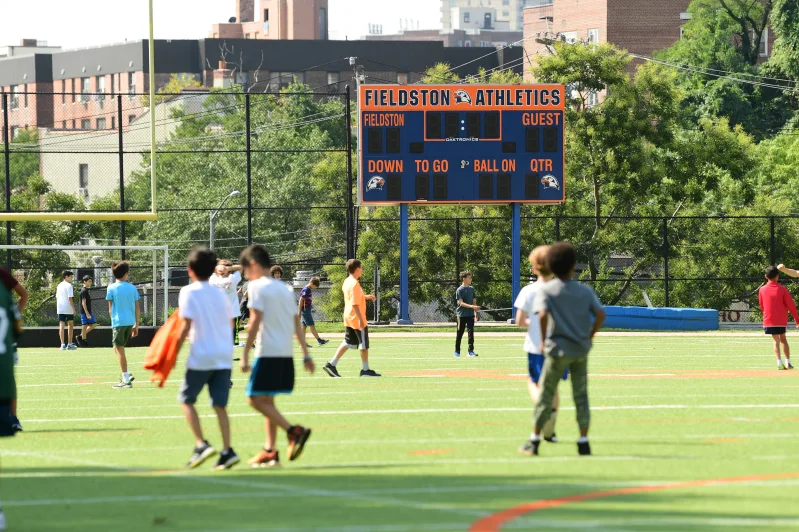
Science
The Science Department helps students think critically about the world and learn through exploration and experimentation. During the three-year course of study, students explore topics in environmental, life, and physical science. Students also learn about historical perspectives of science and the diverse groups of people who have built our body of knowledge.
The program is housed in a LEED-certified building that has a Green Roof serving as an outdoor classroom. Science classes also take place in the School’s spacious laboratories and throughout its expansive campus. The different learning environments provide students with a variety of unique educational opportunities in which they can engage in fieldwork, research, and inquiry.
Our students understand the pillars of scientific inquiry: observation, inference, measurement, and collection and analysis of data; possess increasingly sophisticated critical thinking skills; question data presented to them, establish their own conclusions based on supporting evidence; recognize their own interconnectedness to the world around them; possess verbal and written communication skills to describe class experiences and discoveries; understand abstract concepts; analyze problems and propose creative solutions in an ever-changing world; discuss current issues in the field of science; and engage with the larger scientific community.
Our instructional methods include classes that are student-centered and focus on helping students master science concepts and skills in a variety of ways; engagement in lab experiments, project-based learning, collaboration, individual and group activities, research projects, scientific writing, journaling, written reflection, and discussions; learning by doing, exploring one’s interests, and constructing and creating models and testable questions; encouragement to be curious and think critically; emphasis on the presentation of ideas, scientific literacy, and effective communication; and engagement in interdisciplinary activities that connect science to mathematics and other coursework.
Theatre and Dance
The Theatre and Dance Department provides students with the opportunity to participate in all aspects of performing arts. Students receive training and experience in acting, dance, directing, choreography, stagecraft, design, writing, and more. The department challenges its members to create, take risks, and explore, and prides itself on producing a season that is responsive to the needs and conversations happening in our world as we seek to both join in and propel these dialogues.
Theatre Program
Our Theatre Program has a place for everyone. We educate the whole student, from building blocks to technique, original work to student-centered projects. Theatre nurtures each student’s artistic vision and ambition. The student is at the center in mind, body, and spirit.
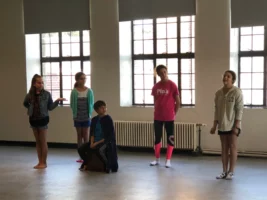
As a part of the sixth grade arts rotation, students spend four weeks writing, choreographing, and rehearsing a three-act musical based on a folktale.
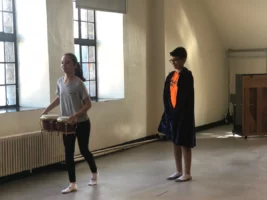
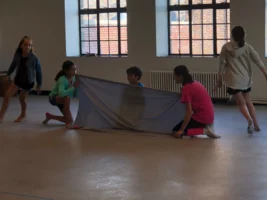
This fall, sixth graders read “The Ring of the King,” from the book “Nelson Mandela’s Favorite African Folktales,” and wrote their own songs, script, and created original choreography inspired by the tale.
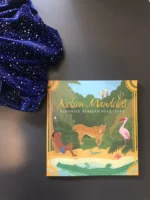
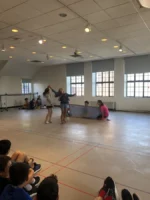
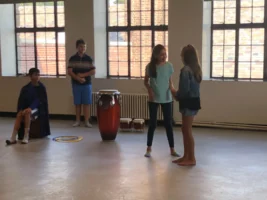
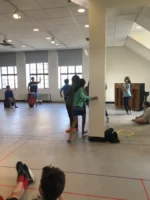
The actors performed their original production for fellow sixth graders on a sunny October morning.
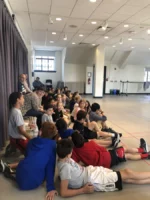
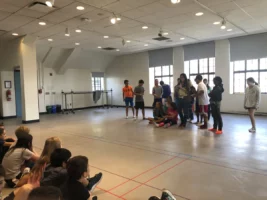
Dance Program
Our Dance Program encourages creative exploration that leads to original dance-making while simultaneously developing physical skills. Through dance exercises, improvisations, and collaborative choreography, students inhabit their bodies in a healthy, conscious, and creative way.
Visual Arts
The visual arts program serves as a bridge between Ethical Culture and Fieldston Lower, where students typically work with one teacher in one studio, and Fieldston Upper, where students choose from a selection of electives. 6th Graders meet in the Art Room, while 7th and 8th Graders meet in a variety of studios with teachers who are specialists in their media.
We encourage students to experience the world — and their feelings and thoughts about it — through the visual arts. Structured assignments put students at the center of their learning and studio practice. With few exceptions, we stress working with real materials rather than working in the virtual, digital world.
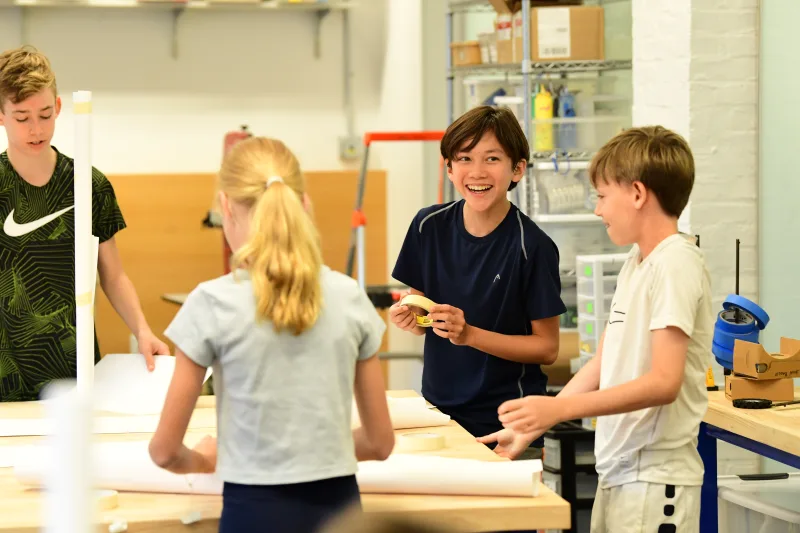
We are committed to developing students who exercise their art-making and creative skills; tap into their creativity in all aspects of their lives; explore a range of media across grade levels; explore their own narratives and passions using visual art; self-direct their creative path; discover how to process their creative mistakes; find value in process, not product; see opportunity in the unexpected; recognize that there is no failure in art; and engage in thoughtful and meaningful dialogue and critique about the work they and their classmates are doing.
Our instructional methods include demonstrations and discussions; group and self-critiques; collaborative work; encouraging students to look to one another for counsel; exposure to a wide range of artists, materials, and techniques; combinations of structured and self-directed projects and assignments; and hands-on projects across the program.
